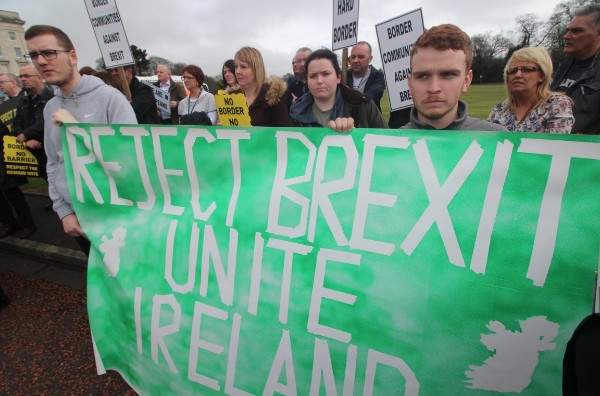29 November 2019
Why a referendum on Irish unity within the next five years is essential

Anti-Brexit demonstrators call for a united Ireland
OVER the coming years, as we approach the centenary of the partition of our country, we have big questions to ask ourselves as a nation; principle among them being: ‘has partition served us well?’
The vast majority of impartial observers would, I have no doubt, conclude that it has not.
Partition forged two mean spirited, narrow minded States on this island.
The systemic failures of the northern state since its inception are well documented.
In the south, economic stagnation encouraged waves of emigration and the overbearing influence of a conservative Catholic hierarchy dominated the State apparatus for decades. Women in particular, the poor and radicals of all kinds were treated shamefully.
Thankfully things have changed in recent years, particularly since the late nineties with the advent of the peace process and the Good Friday Agreement.
Nonetheless, no other conclusion can be drawn other than that partition has failed our country and prevents our island from reaching its potential; across economic, social, political and cultural spheres to this day. It continues to hold back, as James Connolly put it: ‘the wheels of progress.’
But that’s changing.
Brexit looms, and no matter what arrangements are put in place to manage it, Ireland - north and south - will suffer. Alongside that, changing demographics and the erosion of the Unionist majority in the north have changed the dynamic of the discussion surrounding Irish unity.
The discussion about Irish unity is live, the demand for unity is real, momentum is building and a referendum on Irish unity is on the horizon - sooner rather than later.
In a series of polls, a majority in the north have indicated that there is now a real demand for a United Ireland and polls indicate a similar sentiment in the south.
Logic dictates that we must now prepare for a united Ireland in the coming years and we need institutional and legislative arrangements in place now to ease the transition to Irish unity, because we are behind the curve in preparing to facilitate constitutional and political change.
Some of the work is done.
The European Council agreed in April 2017 that the whole of our island would be afforded membership of the EU in the event of national reunification.
That issue is settled.
There’s a lot more to do however, and instead of staring blindly into the abyss, it is incumbent on the Irish government to take this seriously and act now to defend and promote an all-island view.
That preparation should include convening an All-Ireland Forum on Irish Unity and that should happen without delay.
In addition to an All-Ireland Forum, a dedicated Oireachtas Committee is needed to plan for legislative changes required, and the government needs to bring forward a Green Paper on the issues that need to be addressed to merge public bodies and services and tackle the hangovers of partition.
The government must also begin meaningful engagement with the British government on all of this - not least in arranging a date to hold a referendum on Irish unity in the north within five years - as well as putting in place plans for a referendum in this State; in line with the provisions of the Good Friday Agreement.
There is nothing radical about any of this.
A referendum on Irish unity is expressly provided for in the Good Friday Agreement; an agreement that was endorsed by the people of this island, north and south, overwhelmingly over 20 years ago.
The demand is real, and the conversation can no longer be couched around the language of “aspiration” and the attitude of the southern establishment that we want a United Ireland “someday, but not now” no longer cuts it.
It is time the people had their say and it’s time we started planning for their verdict.
Follow us on Facebook
An Phoblacht on Twitter
Uncomfortable Conversations

An initiative for dialogue
for reconciliation
— — — — — — —
Contributions from key figures in the churches, academia and wider civic society as well as senior republican figures





